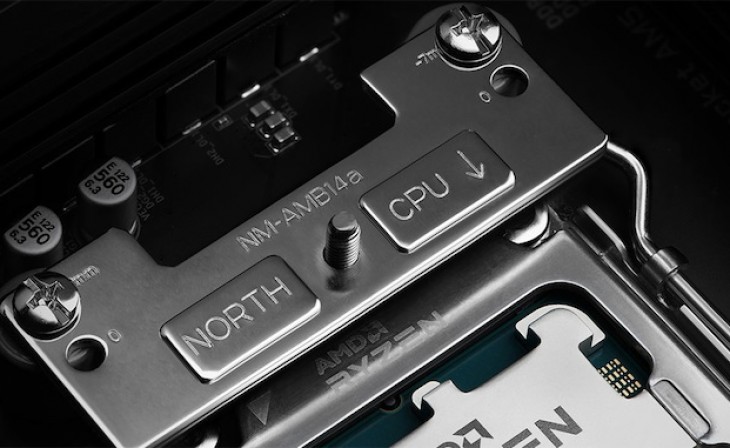Noctua Introduces Innovative Cooler Mounting for AMD's AM5 CPUs
Noctua's Solution to AMD Ryzen 7000 Series' High Temperatures
The Challenge of Cooling High-Performance CPUs
AMD's Ryzen 7000-series CPUs, known for their high operating temperatures, have posed a challenge in terms of cooling efficiency. Typically, high-performance coolers like all-in-one liquid systems are employed to manage these temperatures. However, Noctua, a renowned cooling solutions manufacturer, has proposed an alternative method to improve cooling performance.
The Innovation of Offset Cooler Mounting
A Simple yet Effective Approach
Noctua's approach involves offsetting the CPU cooler mount by 7mm, which, according to their research, can reduce the processor's temperature by up to 3°C. This method is a cost-effective solution compared to investing in more expensive cooling systems.
Understanding the Need for Enhanced Cooling
Factors Contributing to Increased Cooling Needs
Several factors contribute to the need for better cooling for the Ryzen 7000-series processors. Firstly, these CPUs feature a thicker integrated heat spreader (IHS) than their predecessors, likely to maintain compatibility with AM4 coolers. Secondly, the core complex dies (CCDs) in these processors are positioned closer to the southern edge of the socket, adding to the cooling challenge.
Also Check Netgear Nighthawk RS700S: The Ultimate Wireless Router
Noctua's Cooling Optimization
Refining Heatsink Positioning and Contact Pressure
Noctua's solution involves strategically optimizing the heatsink position over the CCDs and enhancing contact pressure between the cooler and the CPU. This adjustment has shown to significantly improve cooling performance and reduce CPU temperatures.
Variable Factors and Cooling Results
Impact of Different Variables on Cooling
The effectiveness of Noctua's new mounting offset can vary based on several factors, such as heat flux densities, CPU and radiator tolerances, and the application of thermal paste. Despite these variables, the new mounting approach typically results in a temperature reduction of 1–3°C for top-tier AM5 CPUs.
The Benefits of Improved Cooling
Enhancing CPU Performance and Noise Reduction
The reduction in core temperatures can lead to more efficient CPU cooling, allowing for higher boost clocks, or enabling reduced fan speeds and lower noise levels. This improvement is particularly beneficial for gaming systems that utilize the latest high-performance processors and graphics cards. Additionally, Noctua's new mounting bars can also enhance the cooling of AM4 CPUs.
Noctua CEO's Insights
Roland Mossig on the Impact of Offset Mountings
Roland Mossig, Noctua's CEO, shared insights into the company's experimentation with offset mountings. While previous attempts with AM4 chiplet processors yielded modest improvements, the AM5 platform's unique heat-spreader design led to more significant temperature reductions, making it a valuable upgrade for Ryzen 7000 users.
Availability of Updated Cooler Bundles
Upcoming Release of Offset Bars
Noctua plans to update its cooler bundles to include the new offset bars, but this update is expected to be available in Q4 2023. In the meantime, Noctua will offer four different mounting kits - NM-AMB12, NM-AMB13, NM-AMB14, and NM-AMB15 - for existing AM4 and AM5 coolers. These kits will be available either directly from Noctua or through Amazon for a nominal fee.
Conclusion: Noctua's Innovative Approach to Cooling
A Game-Changer for AMD Users
Noctua's introduction of an offset cooler mounting system presents a simple yet highly effective solution to the cooling challenges faced by AMD's Ryzen 7000 series CPUs. By enhancing heatsink positioning and improving contact pressure, Noctua offers a cost-effective and efficient way to lower CPU temperatures, potentially boosting performance and reducing noise. This innovation is set to benefit both existing and future users of high-performance AMD processors.




